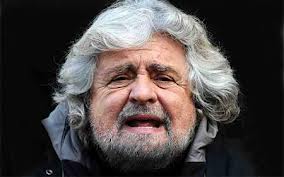ROME, (Reuters) – The outcome of Italy’s national election is still uncertain but what is already clear is that the massive winner is Beppe Grillo, a shaggy haired comedian whose anti-establishment 5-Star movement could well become the country’s largest party.
It had been clear from weeks that Grillo, with his fiery invective against the traditional parties, was making impressive progress in the polls, but no pundits had imagined he could win around a quarter of the votes cast.
“It’s marvellous, in three years we have become the biggest party in Italy,” Grillo said in uncharacteristically calm tones in his first comments after the vote in a live video feed.
“It’s been a wonderful adventure and we will do everything we promised in the election campaign,” he said.

Touring the country in a camper van and attracting tens of thousands to his rallies, 64 year-old Grillo channelled the rage and frustration of Italians at the rampant waste and corruption of their political leaders.
Grillo wants Italy to hold a referendum on remaining in the euro. His policy platform, which sapped votes from the left and right alike, includes cuts in politicians’ privileges, a minimum income for the unemployed, clean energy and free internet.
“The implications of Grillo’s success extend far beyond Italy,” said London-based political think-tank Demos. “His success demonstrates an appetite for change, and mainstream parties would do well to take the movement seriously.”
Grillo now holds the key to any chance of a government being formed in the euro zone’s third largest economy.
Vote projections suggest the 5-Star Movement is now vying with the centre-left Democratic Party to be Italy’s biggest political force, on course to gain 26 percent of the vote, ahead of the 25 percent for the PD, which is running as part of a centre-left coalition.
That would be enough to give him around 110 seats in the 630-seat lower house and 64 in the 315-seat Senate, making him crucial to any potential coalition.
After decrying him for months as a rabble rousing demagogue, the other parties are already hinting that they are ready to do business with him.
“We have to try to work with them to find points that we agree on,” said Alessandra Moretti, a candidate with PD, which failed to win the election victory that was expected.
It remains to be seen whether Grillo wants to play ball.
EURO REFERENDUM
Most of the 5-Star candidates, who were picked in primary elections conducted on the internet, are complete newcomers to politics at any level. A quarter come from blue-collar jobs.
Grillo himself did not run for election because a manslaughter conviction from a traffic accident in 1981 made him ineligible under his movement’s rule banning candidates with criminal records.
He says he is merely 5-Star’s “guarantor” and spokesman.
A prolific blogger, he never appears on political talk shows and also bans his movement’s candidates from doing so, to avoid them being associated with the “zombies” representing traditional parties.
While Grillo’s rhetorical skills make him an ideal front man, many analysts point out that his movement’s followers, often young professionals, tend to be far more down to earth and pragmatic.
The average age of the four mayors elected by the Five-Star Movement in local elections last year was 31, in contrast to the gerontocratic world of Italian politics.
Grillo’s campaign culminated on Friday with a rally which drew hundreds of thousands of people to what used to be the traditional meeting place of Italy’s left.
Screaming in his trademark hoarse voice, he yelled to the crowd in a rising crescendo: “We have become the third biggest, the second biggest, the biggest party in Italy.”
Few commentators thought that was possible, although the comments of scores of voters to Reuters outside polling stations around the country suggested something remarkable was afoot.
“I’m sick of the scandals and the stealing,” said Grillo supporter Paolo Gentile, a 49-year-old Rome lawyer. “We need some young, new people in parliament, not the old parties that are totally discredited,” he said.
The rise of the 5-Star Movement, which organises itself through the Internet and social networks, has been spectacular.
At its first political test in 2010 it won just 1.8 percent of the vote, rising to 3.4 percent at Milan’s mayoral election the following year. After Monday’s result, no one would now dare try to guess where it might go from here.




